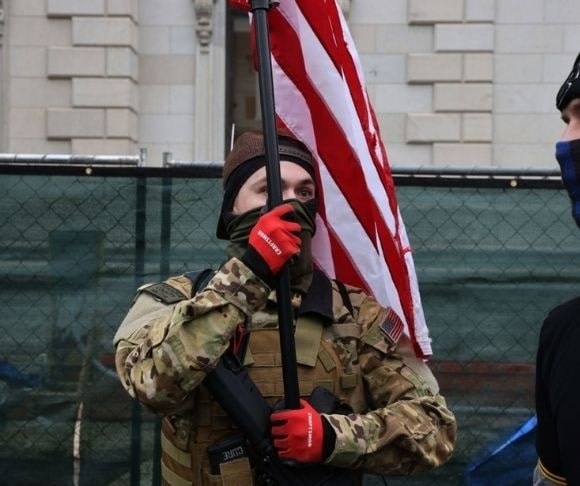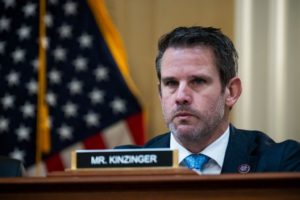
(Photo by Spencer Platt/Getty Images)
How old does one have to be to exercise a constitutional right – or enjoy other rights or privileges generally forbidden to minors? When does one become an “adult”? It seems there’s a lot of confusion over this – and much inconsistency – which gives some in the anti-gun lobby an opening to call for raising the legal age to purchase a firearm to 21. Dare to suggest a seven-year-old cannot choose his or her “gender” (sex, to use the correct terminology), and you will be branded some kind of monster by the activist left these days. But that same seven-year-old is going to have to wait another 14 years until he or she – or whatever he or she becomes – is considered responsible enough to own a gun. What’s that all about? Guns, voting, sexual identity – how old is old enough?
 In most states, the age of majority is 18. But also, in most of them, one must be at least 21 to purchase or consume alcohol. The federal minimum age to buy tobacco products is 21, as of 2019. The age of sexual consent in almost all states is 18. Then again, throughout most of Europe, one can drink alcohol at 18. And, of course, in the United States and all other countries, an 18-year-old can enlist in the military, be trained to use all manner of lethal weapons, and even die for his or her country. So, the threshold of adulthood doesn’t appear to be a matter of universal consensus. As Kramer from the long-running sitcom Seinfeld would say, this is capricious and arbitrary.
In most states, the age of majority is 18. But also, in most of them, one must be at least 21 to purchase or consume alcohol. The federal minimum age to buy tobacco products is 21, as of 2019. The age of sexual consent in almost all states is 18. Then again, throughout most of Europe, one can drink alcohol at 18. And, of course, in the United States and all other countries, an 18-year-old can enlist in the military, be trained to use all manner of lethal weapons, and even die for his or her country. So, the threshold of adulthood doesn’t appear to be a matter of universal consensus. As Kramer from the long-running sitcom Seinfeld would say, this is capricious and arbitrary.
Arm the Children? Why Not?
Some on the left are now talking about banning firearms sales to anyone under 21 – though it’s not just Democrats. Representative Adam Kinzinger (R-IL) – always eager to curry favor with Democrats at any cost – has indicated that he is open to both a ban on “assault weapons” and increasing the minimum age to 21 for gun purchases, which he says is a “no-brainer.” If there’s one person who should be an expert on “no-brainer” issues, it’s Kinzinger.

Adam Kinzinger (Photo By Tom Williams/CQ-Roll Call, Inc via Getty Images)
But should we not be considering lowering the minimum age for gun ownership by quite a few years? According to progressive activists, children as young as seven, or even younger, should be encouraged to discuss their sexuality at school. They should even be permitted – by their teachers, but not by their parents – to undergo sex-reassignment procedures. If a seven-year-old is mature and responsible enough to understand the life-altering repercussions of physically transforming from boy to girl or girl to boy — or so this logic goes — then surely he or she should be ready to own a gun.
The added benefit of arming these young people would be an end to school shootings. Not even a psychopath would be willing to take on a room full of seven-year-old girls who have automatic weapons.
There is an adage that over many decades has been repeated in various forms and attributed to different people. The most common version is credited to Winston Churchill, though he likely never said it: “If you’re under 30 and not a liberal, you don’t have a heart, but if you are over 30 and not conservative, you don’t have a brain.” And it generally appears true that most people who pay heed to political ideology lean to the left when they are young and move further right as they get older – usually because the real world comes at one fast when one starts working, paying taxes, and perhaps starting a business.
Left-wingers can hardly be blamed, then, for thinking that lowering the voting age would benefit them. And many have suggested permitting 16-year-olds to vote. Is that a good or a bad idea? A matter of perspective, surely. There are certainly some compelling arguments both for and against such a change. But why must one be allowed to vote at 16 – or even at 18 – and not be allowed to own a gun until 21? Because there is no comparison between the two things, Democrats would argue. Guns kill. But guns also save lives – an untold number every year, according to CDC and FBI data. Can voting kill? Absolutely. Elect the wrong people and one could ultimately be responsible for a great number of deaths resulting from bad domestic or foreign policy. In a free country, there is no more solemn or consequential burden than that which comes with casting a ballot. If we can trust 16-year-olds with votes, we can trust them with guns.
The Equality of Rights

And there’s another angle to the question of what age one must reach to be trusted. According to National Safety Council data, almost one million Americans in the 15-24 age group have died in motor vehicle accidents between 1913 and 2020 – representing 24.6% of all road vehicle fatalities. The CDC says about seven teens aged 16-19 die every day from injuries sustained in motor vehicle accidents – and that drivers aged 16-19 are “nearly three times as likely as drivers aged 20 or older to be in a fatal crash.” Surely – if saving lives is the goal – we should raise the minimum age for driving to that magic 21-year-old mark.
Or perhaps we should accept the fact that one cannot legislate all risk and danger out of life. Maybe we should also honor the very simple and obvious truth that every individual right contained in the Constitution’s amendments is equal to all the others – no less or more of a right than all others. Indeed, one could argue that the Founding Fathers decided free speech and freedom of religion were first among all rights and self-defense second. If anything, then, the Second Amendment should be safeguarded above all other rights after the First Amendment. But at least it should enjoy equal status – which it already does not.
Is one an adult at 16, at 18, or at 21? Should there even be an “age of majority” at all? Perhaps parents are the only people with the authority to decide at what age their children get to do things and own things. But if we are going to have a “legal” minimum age for anything, let us do it consistently, across the board – and not ban things arbitrarily from certain age groups to appease ideological factions.
Remember to check out the web’s best conservative news aggregator
Whatfinger.com — the #1 Alternative to the Drudge

